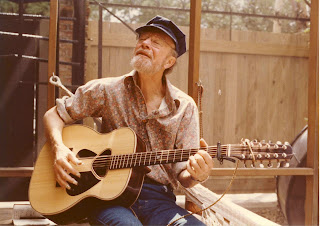Pete Seeger, New Orleans and Lafayette, May 2009
May 2009
Pete Seeger's photographs were made in 1983
Photo credits: Leonard Earl Johnson
Reprinted from Les Amis de Marigny, New Orleans
Pete Seeger,
* * *
Pete Seeger appeared the first week of the 2009 New Orleans Jazz Fest, and turned ninety the next week.
He opened on the Acura Stage with Midnight Special, a song made famous by Huddie "Lead Belly" Ledbetter, of Mooringsport, and the Louisiana State Prison at Angola.
After his performance, Seeger told a story about an invitation to sing at "a little music festival in Lafayette," back in the time of the House UnAmerican Activities Committee.
HUAC was a political witch-hunting committee. Seeger was offended at being forced to appear and testified to the tune of his accompanying Constitutional right to think anything he wanted without telling them what those thoughts might be. This was in the middle 1950s, when he was a very popular figure in the American folk music revival. He was a famous artist with famous principles.
* * *
For every season
A few generations later, Seeger lost his signature instrument, a long-neck banjo he had designed and built in 1945. It was made to accommodate his long arms and vast voice and set a new standard for banjos that came to be known as The Pete Seeger Banjo.
The lost banjo was found near Seeger's upstate New York home, in the case he'd painted with his name and phone number. It had fallen from the roof of his car and was sitting poetically alongside a state roadway. The young man who found and returned it told reporters that he did not know who Seeger was.
Some years before that, Pete and his wife, Toshi were in New Orleans for an earlier Jazz Fest, and staying in the Faubourg Marigny home of the late Shirley Jensen, on the corner of Frenchmen and Dauphine. It was my good fortune to interview and photograph him and his long-neck twelve-string guitar.
Afterwards, we walked back to my apartment, Squalor Heights, to hear Sweet Emma Barrett records. Seeger loved her cover of Jelly Roll Blues (Available through George H. Buck Records, "Sweet Emma Barrett and Her New Orleans Music," GHB-141). Later he wrote about it in the magazine, Sing Out.
That day, on our way to Squalor Heights, Seeger wore a Medieval looking pointed cap with a long peacock feather that dipped and bobbed behind us as we stepped across Faubourg Marigny curbs and stoops. I vainly wondered if anyone seeing us would recognize we were walking in the company of the great Pete Seeger.
* * *
One thing Seeger is is political, in the true style of a troubadour. His early days were spent roaming with Woody Guthrie, whose own guitar famously boasted his hand painted slogan: "This machine kills fascists." Guthrie wrote and sang significant songs, like This Land Is Your Land. Both men were union supporters and likely candidates to someday lock horns with reactionary Congressmen.
Back in Washington, the House UnAmerican Activities Committee charged him with contempt of congress for not telling them his thoughts. An odd situation, given that Seeger was a man who spent his entire life telling the whole world what he thought.
 upstate New York camps for mostly New York City children. At our lunch, years later in Manhattan, we were stopped in every block for now middle-aged handshakes from grateful camp kids.
upstate New York camps for mostly New York City children. At our lunch, years later in Manhattan, we were stopped in every block for now middle-aged handshakes from grateful camp kids. Seeger's television ban was not lifted until his 1967 appearance on the brave Smothers Brothers Comedy Show.
* * *
 'It's America, I have a right to think anything I want, but I don't have to discuss it unless I want to.'
'It's America, I have a right to think anything I want, but I don't have to discuss it unless I want to.'"They said, 'That's not sufficient.'
"I had been asked to come down (to Lafayette) and sing some songs at a little festival. They (festival organizers) said, 'Mr. Seeger, this evening we're going to have a little party, so you can hear some of our local music.'
"Well, at the door, they said, 'Pete Seeger, meet Congressman Edwin E. Willis'."
(Edwin Edwards Willis was the Louisiana Democrat, from nearby Arnaudville, who served as chair of the Un-American Activities Committee, 1963-69.)
"Well, he did a double-take, and I did, too. "They said, 'Let's get some singing going,' and Willis glowered in the corner.
"Later, he (Willis) said, 'Mr. Seeger, it's a small world. How did you get here?'
"I said, 'Well, I was invited.'
"He said, 'Who invited you?'
"I said, 'The Chamber of Commerce.'
"Willis was not amused, or appeased. He said, 'Well, you're not welcome.'
"I went on to California. I didn't want to make trouble for anybody."
Copyright, 2009, Leonard Earl Johnson
* * *
 Be Safe This Hurricane Season
Be Safe This Hurricane Season~ L. A. Norma

